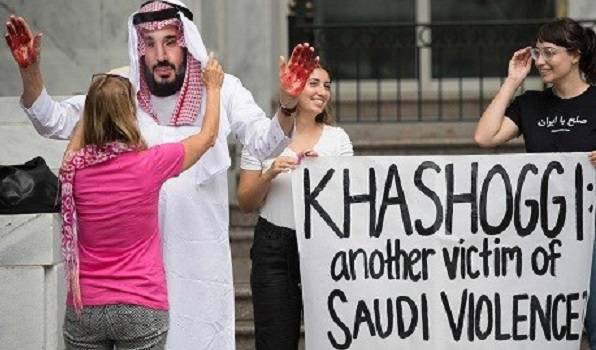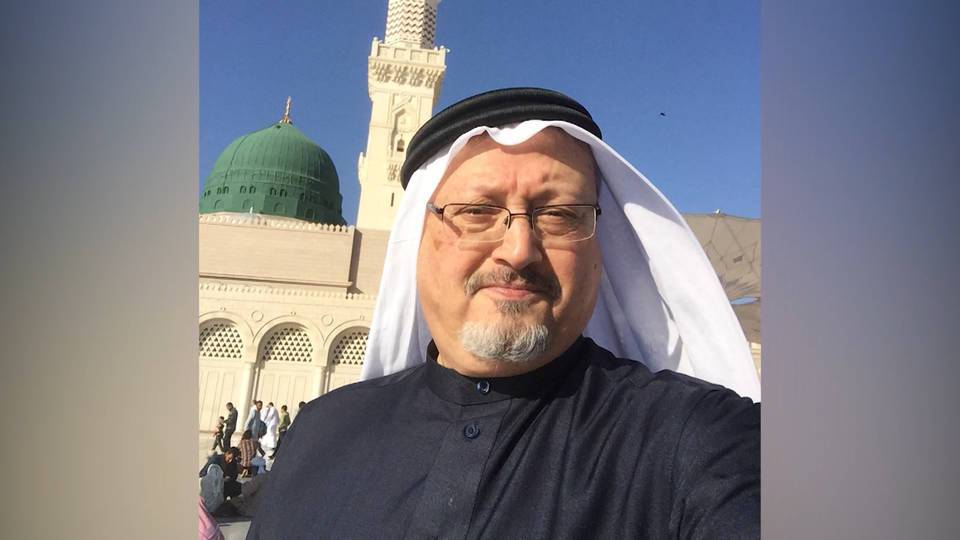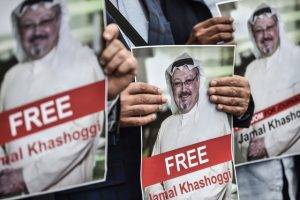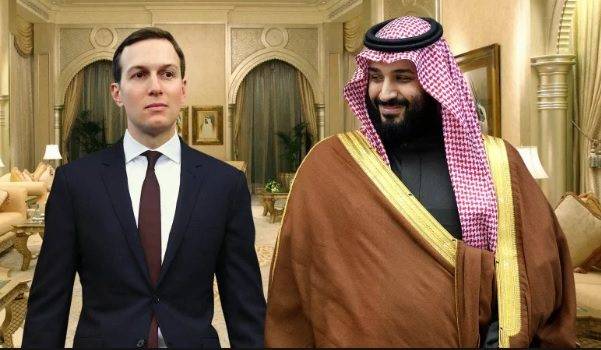US Intelligence Knew of Khashoggi Plot

‘Are you kidding? I don’t trust them one bit,’ – Washington Post Contributor Jamal Khashoggi on the Saudi’s invitation to visit the Kingdom
The Washington Post reported on Wednesday that, according to a person familiar with the communications, which were intercepted before he vanished, U.S. intelligence knew about a Saudi plan to capture dissident and Post contributor Jamal Khashoggi. According to the report, it is unclear whether the Saudis wanted to capture to interrogate or to kill Jamal Khashoggi
Turkey said on Tuesday that it would search Saudi Arabia’s consulate in Istanbul where the Saudi journalist vanished last week, and close ally Britain called on Riyadh to provide “urgent answers” over his disappearance.
According to the report, it is unclear whether the Saudis wanted to capture to interrogate or to kill him. Also it is unknown whether the U.S. warned the journalist he was a target, the source claimed.
Khashoggi was last seen one week ago entering the consulate in Istanbul to get documents related to his forthcoming marriage. His fiancée, waiting outside, said he never emerged and Turkish sources said they believe Khashoggi, a prominent critic of Saudi policies, was killed inside the mission.
Turkey’s President Tayyip Erdogan asked Saudi Arabia on Monday to prove its assertion that Khashoggi left the consulate.
The U.S. State Department said it did not know what happened to Khashoggi and whether he was alive or not.
The admission seems strange since it was known to US intelligence that the crown prince of Saudi Arabia ordered an operation to lure a Washington Post columnist back to Saudi from his home in Virginia and detain him, according to US intelligence intercepts.
The intelligence, described by US officials familiar with it, is another piece of evidence implicating the Saudi regime in the journalist Jamal Khashoggi’s unexplained disappearance last week after he entered the Saudi Consulate in Istanbul.
Turkish officials say that a Saudi security team lay in wait for Mr Khashoggi and killed him.

Saudi critic and Washington Post Contributor, Jamal Khashoggi, abducted in the Saudi Consulate of Turkey and likely murdered in state-sponsored hit
WHO WAS KHASHOGGI?
Mr Khashoggi was a prominent critic of the Saudi government, and crown prince Mohammed bin Salman in particular.
Several of Khashoggi’s friends said that over the past four months, senior Saudi officials close to the crown prince had called Mr Khashoggi to offer him protection if he returned to his home country.
Officials also offered him a high-level job working for the government.
Mr Khashoggi, however, was sceptical of the offers. He told one friend that the Saudi government would never make good on its promises not to harm him.
“He said: ‘Are you kidding? I don’t trust them one bit,’ ” said Khaled Saffuri, an Arab American political activist recounting a conversation he had with Mr Khashoggi in May.
The intelligence pointing to a plan to detain Mr Khashoggi in Saudi Arabia has fuelled speculation by officials and analysts in multiple countries that what transpired at the consulate was a backup plan to capture him that may have gone wrong.
A former US intelligence official – who, like others, spoke on the condition of anonymity to discuss the sensitive matter – noted that the details of the operation, which involved sending two teams totalling 15 men, in two private aircraft arriving and departing Turkey at different times, bore the hallmarks of a “rendition”.
Donald Trump said, “I have to find out who did it,” when asked if he will hold Saudi Arabia responsible, which seems disingenuous if he is indeed getting regular intelligence briefings. This is an operation in which someone is extralegally removed from one country and deposited for interrogation in another. Such moves are seldom made in isolation.
But Turkish officials have concluded that whatever the intent of the operation, Khashoggi was killed inside the consulate – and this too, not before being tortured.
15 SAUDIS INVOLVED IN OPERATION: TURKEY
Turkey is looking for a ‘black van’ in search for missing Saudi journalist Investigators have not found his body, but Turkish officials have released video surveillance footage of Mr Khashoggi entering the consulate on the afternoon of 2 October. There is no footage that shows him leaving, they said.
The intelligence about Saudi Arabia’s earlier plans to detain Mr Khashoggi have raised questions about whether the Trump administration should have warned the journalist that he might be in danger.
Intelligence agencies have a “duty to warn” people who might be kidnapped, seriously injured or killed, according to a directive signed in 2015.
The obligation applies regardless of whether the person is a US citizen. Mr Khashoggi was a US resident.
“Duty to warn applies if harm is intended towards an individual,” said a former senior intelligence official.
But that duty also depends on whether the intelligence clearly indicated Mr Khashoggi was in danger, the former official said.
“Capturing him, which could have been interpreted as arresting him, would not have triggered a duty-to-warn obligation,” the former official said. “If something in the reported intercept indicated that violence was planned, then, yes, he should have been warned.”
The Office of the Director of National Intelligence, which oversees the warning process, declined to comment on whether Mr Khashoggi had been contacted.

Protestors hold pictures of missing journalist Jamal Khashoggi during a demonstration in front of the Saudi Arabian consulate on October 8, 2018
Administration officials have not commented on the intelligence reports that showed a Saudi plan to lure Mr Khashoggi.
“Though I cannot comment on intelligence matters, I can say definitively the United States had no advance knowledge of [Khashoggi’s] disappearance,” deputy State Department spokesman Robert Palladino told reporters on Wednesday.
Asked whether the US government would have had a duty to warn Mr Khashoggi if it possessed information that he was in jeopardy, Mr Palladino declined to answer what he called a “hypothetical question.”
EFFECT ON US MIDTERMS
The US initially stayed relatively quiet — but pressure for a more robust response is increasing as lawmakers called for a probe into the 59-year-old’s fate.
A combination of Trump’s world view and his Middle East ambitions have meant the White House has been loath to criticize Saudi Arabia or Crown Prince Mohammed bin Salman, the kingdom’s 33-year-old de facto ruler.
Trump has made clear that his administration will not make human rights overseas a priority; he and especially his son-in-law and senior adviser Jared Kushner maintain close ties to the crown prince; and Trump has long had business ties to Saudi Arabia, where he made his first foreign trip as President.
More crucially, Trump has established a trio of goals in the Middle East that depend on Saudi Arabia’s rulers and their money. The kingdom is central to the Trump administration’s goals on Middle East peace, its effort to fight ISIS in Syria and elsewhere, and its foreign policy priority of countering Iran.
“We don’t know what has happened to him. We don’t have any information on that,” spokeswoman Heather Nauert told reporters adding: “We don’t want to make any judgments about what happened.”
Saudi Arabia has dismissed as baseless accusations that it killed or abducted Khashoggi, and on Tuesday Turkey’s state-owned Anadolu agency said Riyadh had invited Turkish experts and other officials to visit the consulate.
Britain urged the Saudi government to explain what happened. “Just met the Saudi ambassador to seek urgent answers over Jamal Khashoggi,” U.K. foreign minister Jeremy Hunt said on Twitter.
“Violence against journalists worldwide is going up and is a grave threat to freedom of expression. If media reports prove correct, we will treat the incident seriously – friendships depend on shared values,” he wrote.
Canadian Prime Minister, Justin Trudeau, conscious of his very public spat over detaining a journalist some months back, was circumspect in his remarks. Without condemning the Saudis outright, he insisted Canada has done plenty when it comes to calling the kingdom on the diplomatic carpet over its dismal human rights record.
“We have been extremely active both in private and in public over many years now around our concern for human rights in Saudi Arabia, and we will continue to be clear and strong in speaking up for human rights around the world, regardless of with whom,” Trudeau told a news conference at la Francophonie’s biennial summit in Armenia.

Trump’s son-in-law is reportedly close to the Saudi Crown Prince, Muhammed bin Salman (MBS for short) who may have ordered the hit on Khashoggi
![]() Turkey’s Foreign Ministry spokesman Hami Aksoy said the investigation was “continuing intensively”. The Vienna Convention on diplomatic relations allowed for consulates to be searched by authorities of a host country with consent of the mission chief, he said.
Turkey’s Foreign Ministry spokesman Hami Aksoy said the investigation was “continuing intensively”. The Vienna Convention on diplomatic relations allowed for consulates to be searched by authorities of a host country with consent of the mission chief, he said.
“The consulate building will be searched in the framework of the investigation,” Aksoy said in a written statement.
There was no immediate comment on the report from the Saudi authorities.
News agency Anadolu later reported that a private plane that had arrived from Saudi Arabia at Istanbul’s Ataturk Airport was searched last Tuesday, the day Khashoggi was last seen. The search proved fruitless and the plane took off again afterwards, it said.
A Turkish security source had previously told Reuters that a group of 15 Saudi nationals, including some officials, had arrived in Istanbul in two planes and entered the consulate on the same day Khashoggi was there, and later left the country.
It was not immediately clear if the Anadolu report referred to one of those aircraft.
“FORCED DISAPPEARANCE”
Khashoggi left Saudi Arabia last year saying he feared retribution for his criticism of Saudi policy over the Yemen war and its crackdown on dissent, and since then wrote columns for the Washington Post newspaper. His disappearance sparked global concern.
In an essay in the Washington Post, Khashoggi’s fiancée, Hatice Cengiz, implored U.S. President Donald Trump and first lady Melania to “help shed light on Jamal’s disappearance.”
“Although my hope slowly fades away each passing day, I remain confident that Jamal is still alive,” Cengiz wrote.
“Perhaps I’m simply trying to hide from the thought that I have lost a great man whose love I had earned.”
Trump said earlier on Tuesday he plans to speak with the Saudis without elaborating. Speaking at the White House, he said he did not have details about Khashoggi’s disappearance
The U.N. human rights office urged both Turkey and Saudi Arabia to investigate what it called the “apparent enforced disappearance” and possible murder of Khashoggi.
“We call for cooperation between Turkey and Saudi Arabia to conduct a prompt and impartial investigation into the circumstances of Mr Khashoggi’s disappearance and to make the findings public,” U.N. human rights spokeswoman Ravina Shamdasani told a Geneva news briefing.
The two countries have such an obligation under both criminal law and international human rights law, she said.
In July, the U.N. human rights office called on Saudi Arabia to release all peaceful activists, including women held for campaigning against a ban on driving as it was being lifted.
Khashoggi was once a Saudi newspaper editor and is a familiar face on political talk shows on Arab satellite television networks. He used to advise Prince Turki al-Faisal, formerSaudi intelligence chief and ambassador to the United States and Britain.
His disappearance is likely to further deepen divisions between Turkey and Saudi Arabia. Relations were already strained after Turkey sent troops to the Gulf state of Qatar last year in a show of support after its Gulf neighbours, including Saudi Arabia, imposed an embargo on Doha.
The two Turkish sources told Reuters on Saturday that Turkish authorities believe Khashoggi was deliberately killed inside the consulate, a view echoed by one of Erdogan’s advisers, Yasin Aktay, who is a friend of the Saudi journalist.
Erdogan told reporters on Sunday that authorities were examining camera footage and airport records as part of their investigation. He has also said Turkey has no documents or evidence regarding the case.
The European Union fully supports U.S. Secretary of State Mike Pompeo, who called on Riyadh to investigate Khashoggi’s disappearance, EU policy chief Federica Mogherini said.
Saudi Arabia is one of the United States’ most important allies in the Middle East. Saudi Arabia is also a tyrannical monarchy that punishes dissent, oppresses its own people, and has supported the spread of an intolerant form of Islam worldwide. These two realities exist in uneasy tension with each other and summarize the strategic challenge that has beset U.S. policy toward the kingdom for the past several decades. The U.S.-Saudi relationship has weathered many disagreements and crises before, the most acute being the OPEC oil embargo of the 1970s and the aftermath of the 9/11 attacks, when it came out that 15 of the 19 hijackers were Saudi citizens. Yet, more often than not, U.S. and Saudi leaders have been able to walk this relationship tightrope together without either slipping or falling off.
Could it be that then as now, the US intelligence establishment knows more than it is willing to reveal, and the information is so troublesome that the US is put in a no-win situation? If somehow the recordings could be made public, at last, we will all know what the US military intelligence establishment knows. And, that would go a long way to lifting the veil of secrecy over US foreign policy in the Gulf.
 The Global Calcuttan Magazine
The Global Calcuttan Magazine 